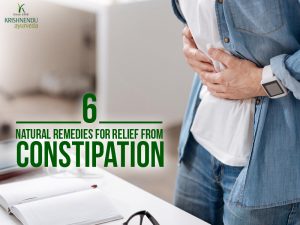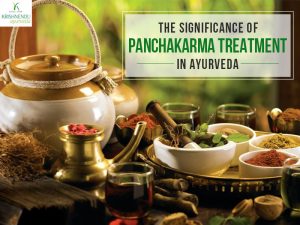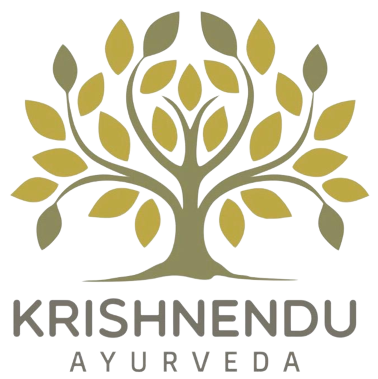Blog

6 Natural Remedies For Relief From Constipation
Constipation is the inability to evacuate the bowels or the condition wherein the stools become hard to pass. It presents with symptoms like straining during or unable to have a bowel movement, a feeling of incomplete bowel movement and dry, hard and pellet-like stools. According to Ayurveda, impaired Vata dosha and its cold and dry qualities disturb the colon leading to constipation. Countering the excess vata and restorative measures for the digestive tract using warmth, oil and hydration are the remedies Ayurveda proposes for relief from constipation Natural remedies for constipation Warm fluids – Drink warm and hot fluids to counter Vata’s cold quality. Sip on warm water throughout day or drink herbal tea with ginger. Organic oils – Adding oils in diet will help lubricate the tissues and counteract the Vata build-up in the body. Use sesame oil, ghee or olive oil for cooking to promote bowel movement. Fruits -Increase the intake of fruits to make use of their fibrous and hydrating properties to pacify Vata. Ripe bananas, apples, soaked raisins and prunes, peaches, etc. will help with the regularity of bowel movements. Triphala – The traditional Ayurvedic formula of three fruits support healthy elimination. Take 2 Triphala tablets with a glass of warm water before bed or steep 1 and ½ teaspoons of Triphala powder in warm water for 10 minutes and drink once it is cool. Milk and ghee – Drink a cup of boiled milk mixed with a 1 or 2 teaspoons of ghee before going to bed. Flaxseeds – Boil a tablespoon of flaxseeds in a cup of water for 2 to 3 minutes and drink it when cool before going to bed.




6 Amazing Health Benefits Of Amla
Amla or Indian gooseberry is an active ingredient employed by Ayurveda since centuries. Being a powerhouse of nutrients and providing numeral health benefits, this versatile sour fruit is considered an Ayurvedic superfood which is therapeutic to various health conditions. Key benefits of amla Excellent source of Vitamin C Tridoshic – Balances Vata, Pitta and Kapha Anti-inflammatory Natural antioxidant Balances agni or digestive fire High in digestive fibre Diuretic in nature 1. Promotes digestion Amla is alkaline in nature and this makes it helpful for strengthening the digestive process. It also improves appetite and kindles the digestive fire, which are important for healthy digestion. The bitter taste and cooling energy also help flush excess heat out through the bowel. 2. Detoxification and healthy elimination Rich in antioxidant, amla promotes detoxification by supporting healthy circulation, digestion and elimination. The high digestive fibre in it also helps relieve constipation and indigestion aiding for healthy elimination. 3. For healthy blood sugar levels Its ability to stimulate microcirculation and build ojas is considered to boost healthy blood sugar levels. Also, amla is diuretic in nature and thus boosts healthy excretion of urine which is key in maintaining balanced blood sugar levels. And for diabetic patients, amla assists in the proper absorption of insulin to help reduce blood sugar levels. 4. Boosts immunity Amla is a rich source of antioxidants and vitamins which reduces the damage by free radicals on the cells and thus improves the body’s immunity. It also strengthens the tissues and promotes overall health and well-being. 5. Strengthens bones The high calcium content and the ability to reduce osteoclasts or the cells that are responsible for breaking up bones, make amla beneficial for bone heath. The fruit also helps in calcium absorption for good health of bones, teeth, nails and hair. 6. Hair health Amla is considered an excellent tonic for hair health. It enriches hair growth, strengthens roots and improves lustre. The carotene content, iron content and antioxidant capacity reduces the damage of hair follicles and thus reduces hair loss.




Tips To Get Rid Of Indigestion Through Ayurveda
Ayurveda treatments regards the imbalance of Pitta dosha as the cause for indigestion. Vitiated pitta impairs the digestive fire that is responsible for proper digestion and causes indigestion. Pitta aggravating foods, stress and environmental factors can lead to hyperacidity, peptic ulcers and other types of inflammatory disorders in the stomach. Below listed are some Ayurvedic home remedies to help prevent and get rid of indigestion. Chew on 5-10 ajwain seeds taken with a pinch of rock salt and wash it down with water to help release the enzymes to boost digestive function. Drink amla juice every morning on an empty stomach to help balance the pH in the stomach and to cure problems like acidity and constipation. Chew on a fresh small piece of ginger after meals to prevent gas and indigestion. Adding ginger in the diet through seasoning, ginger juice or as ginger tea is also beneficial. Powdered black pepper mixed with jaggery is an effective remedy for heartburn and acidity, while pepper powder and cumin mixed in buttermilk can be taken during indigestion and acidity. Tulsi can alleviate the effect of gastric acids and hence chewing on 5-6 tulsi leaves or drinking tulsi tea has healing benefits for acidity. Pomegranate juice helps balance the acid in the stomach. Even though it is sour, it is also astringent and bitter which help balance Pitta. Include split mung daal, green leafy vegetables, watermelon, mangoes, grains and spices like fenugreek, coriander, mint and cardamom in your diet. Practices to avoid if you are experiencing indigestion. Reduce pitta aggravating foods like citrus fruits, vinegar, tomatoes, spicy foods, fried foods, salty and processed foods, etc. Do not skip meals and eat at regular intervals. Do not skip breakfast even if you are not hungry in the morning. Avoid tobacco, alcohol, strong tea and coffee, sweets and aerated drinks. Avoid high-stress situations.




The Significance Of Panchakarma Treatment In Ayurveda
What is a Panchakarma treatment? Panchakarma in Sanskrit translates to 5 treatments. These are the primary purification and detoxification processes mentioned in Ayurveda. The objective of a Panchakarma treatment is to eliminate toxins and vitiated doshas and build the immune system through the 5 types of therapies namely Vamana, Virechana, Vasti, Nasya and Raktamokshana. Why to do a Panchakarma treatment? Panachakarma has a profound effect on cleansing the body off impurities and toxins which can be the root cause of many diseases. The therapeutic benefits aims for rejuvenation and to improve longevity, while also restoring body’s inner balance and vitality. What are the benefits of doing a Panchakarma treatment? Balances vitiated Vata, Pitta and Kapha doshas Cleanses the body off accumulated toxins and impurities Helps balance nervous, circulatory and digestive systems Promotes mental and physical efficiency Improves joint flexibility, vigor and stamina Eliminates stress, anxiety and depression Restores body’s innate healing ability What is the Panchakarma process? Panchakarma is a five-fold therapy that is highly customized according to an individual’s prakriti or body constitutional type, doshic imbalances, age, immunity, digestive strength, metabolism, etc. The Panchakarma process begins with the consultation of a qualified Ayuvedic physician to determine the aforesaid factors. The Panchakarma treatment is divided into 3 phases namely Poorva Karma, Pradhan Karma and Pashchath Karma. Poorva Karma – The preparatory or primary phase in which the channels of the body are opened up through oleation and sudation procedures known as Snehana and Swedana. Treatments like Abhyangam, Pizhichil, Shirodhara, Njavara Kizhi, medicated steam bath, etc. are done as part of preparing the body. Pradhan Karma – It is the main phase where the 5 significant therapies are performed. Vamana – It is a process of medicated emesis, where the toxins in the upper body parts like diaphragm and respiratory tract are eliminated through vomiting. Virechana – It is a purgation procedure that concentrates on the lower part of the gut to clean the bowel. Vasti – The process includes administering herbal oils and decoctions for a medicated enema. Nasya – Medicines are administered through the nose to cleanse and rejuvenate the nasal passages. Raktamokshana – The process of bloodletting through which impure blood is removed from the bloodstream. Pashchath Karma – The treatments are concluded in this last stage and the body is prompted to undergo rejuvenation through proper diet, yoga, pranayama and meditation. Panchakarma at Krishnendu Ayurveda At Krishnendu Ayurveda, the ideal program for an individual is formulated after an in-depth study on the physical health and medical history. A customised module consisting of therapeutic massages, dietary counselling and body detoxification or rejuvenating treatment is prepared for each. The average modules are between 7 to 28 days. All therapies are conducted by experienced therapists and masseurs or masseuses under the supervision of professional Ayurvedic physicians.




Stiff Neck And Its Management In Ayurveda
Stiffness or pain in the neck is characterized by soreness or difficulty in moving the head. Many experience neck pain from continuous sitting focused on the computer monitor and incorrect sitting or lying postures. The most common instance of neck pain appears upon waking up in the morning where the stiffness occurs overnight due to incorrect sleeping position or use of a hard or thick pillow. Chronic neck pain is also a risk factor for Cervical Spondylosis, osteoporosis, disk herniation, muscle sprain or spasm, etc. Stiff neck in Ayurveda Stiffness in neck has been referred to as Manyagata Vata in Ayurveda. It is caused by aggravated Vata dosha that is lodged in the cervical or neck region. Management of neck stiffness include bringing down the vitiated Vata and reducing strain to the cervical region. Ayurvedic therapies for neck stiffness The ayurvedic treatment for neck pain or stiffness is being decided after confirming the root cause of it. The Ayurveda specialist diagnoses and then tailors the ayurvedic treatment plans for the patient. Some of the ayurvedic therapies for neck stiffness are: Greeva Vasti – The process of applying heat to the cervical region by retaining lukewarm medicated with the help of a receptacle made of black gram dough. It is considered highly therapeutic for conditions like Cervical Spondylosis, stiff neck, disc prolapse, etc. Abhyangam – The classic Ayurvedic massage using warm medicated oils is advised for pain and stiffness in the body. It rejuvenates the strained muscles while also providing deep relaxation. Nasyam – Therapeutic administration of medicines through the nasal passages is also considered effective for neck pain and Cervical Spondylosis. Njavara Kizhi – The therapy includes fomentation of the body with boluses of special rice cooked in milk and herbal decoctions. Effective for reducing pain and inflammation in the body, the process is advised for neck pain. Pizhichil – Warm medicated oil is continuously poured on the body along with gentle massages. Recommended for rejuvenation and reducing pain and inflammation, the therapy is effective for neck pain too. Treatments are recommended according to the symptoms and as per the requirements there are some common Ayurveda treatment for neck pain and also some diet practices in Ayurveda which can also help the patients to provide some relief and control from neck pain. For more details, Click here




Ayurvedic Treatment Of Gastritis
Gastritis refers to the inflammation of the mucous lining of the stomach. The condition can impair the secretion of digestive enzymes by the glands of the stomach and cause indigestion. Excessive consumption of alcohol, sour and spicy foods and white flour products are considered to be the root causes. Stress, anger and heat exposure are also believed to aggravate the condition. Symptoms of gastritis Indigestion Abdominal pain Nausea and vomiting Loss of appetite Burping and hiccups Bad taste in mouth and coated tongue Scanty urination Dark stools Ayurveda and Gastritis In Ayurveda, gastritis is known as Urdhva Amlapitta, where in amla means sour and Pitta refers to the doshic imbalance involved. Pitta dosha rests in the stomach and governs the digestive fire and when it is aggravated due to improper dietary habits, it impairs the digestion process, causes production of toxins and over-secretion of digestive enzymes which leads to Gastritis. Ayurvedic management of Gastritis includes restoring the digestive fire with the help of a Pitta-pacifying diet and cooling herbal and medicinal preparations. Ayurvedic therapies for reducing stress and tension are also recommended for the condition. Ayurvedic diet and lifestyle advice Intermittent fasting is helpful in rejuvenating the digestive system. Drink at least 8-9 glasses of water daily to relax the stomach and flush out the toxins. Warm water and juicy fruits like grapes, apples, oranges, water melons, should be eaten more. Avoid coffee and carbonated or alcoholic drinks. Stay away from fermented and processed foods. Avoid sour, salty and spicy foods and rich gravies. Regular exercise and Pranayama is helpful. Home remedies for gastritis Mix half a gram of long pepper powder with one spoon of honey and have it twice a day for relief from gastritis. Chew small pieces of ginger with salt before every meal to reduce the uneasiness from gastritis. To a glass of buttermilk, mix roasted cumin seed powder and dried ginger powder and drink it with breakfast and lunch. Mix one tablespoon of Triphala powder in a glass of water, boil it, reduce it to half a glass and filter. Add one tablespoon of honey or ghee to the hot decoction and drink to relieve gastritis. Boil water with crushed cumin seeds and filter it. Drink this water every day instead of normal water. Also, it is advised to only drink fresh preparation of this water every day.

